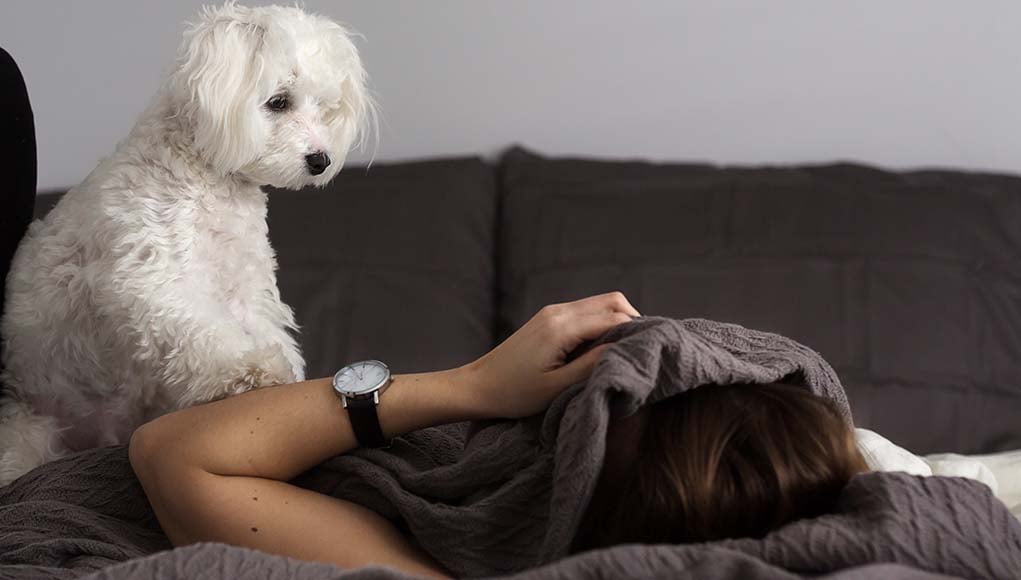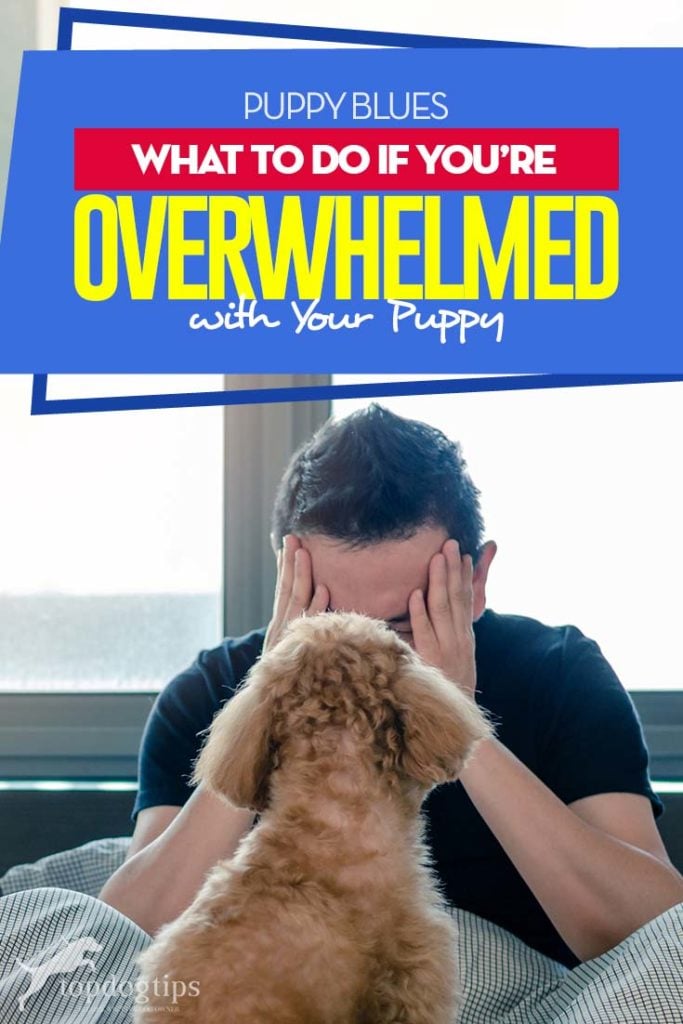Getting a new puppy brings along an abundance of new challenges, and it is easy to get overwhelmed, especially if it is your first puppy. Finding a balance between training and having fun, along with attempting to pick which rules are best for your household can put you in a rut.
Plenty of puppy owners have been through the same thing, but it's just a hump and you can get over it.
What's “Puppy Blues”?
The puppy blues are like post-partum puppy depression. While it is not a medical condition or psychiatric concern, it is a severe struggle. You’re overcome with feelings of anxiety and sadness, leaving you suffering from exhaustion and numbness.
The puppy blues can happen at any point during the puppy stage. It may start right after you bring the dog home for the first time or during that first week, or it may happen after a few months. It could last for a couple of days, weeks, or maybe months if the problem is not addressed.
Do not feel guilty over having feelings of regret, sadness, or anxiety over adopting a puppy. It takes time to settle into a new routine. Make sure you understand and identify these symptoms before blaming yourself or your new puppy.
Feelings Of Regret
These new feelings of sadness may be confusing, and you could find yourself having feelings of regret. You may begin thinking:
- “Is this the right puppy for me?”
- “Did I rush into this?”
- “I wish I had thought through my decision.”
- “Am I horrible for wanting to give my puppy back?”
- “Am I just a terrible owner?”
It may be hard to push past these thoughts to find what the real problem is. No matter what your decision is, the adjustments must aim to create a better environment for yourself and a better home for your puppy (even if this means giving them away).
Anxiety
One of the most common symptoms of puppy blues is anxiety. It can be mind-numbing and confusing as well as overwhelming. It may become hard to do anything involving your puppy without becoming anxious and stressed.
Your anxiety will heighten any feelings of sadness, anger, or helplessness that you may be feeling. You might find yourself eating less, sleeping less, crying often, having trouble focusing, and feeling down in situations you would typically get excited about.
What Causes the Puppy Blues?
 For those that have never adopted and raised a puppy, it can be hard to imagine that the puppy blues exist, but it's fairly common among owners. Caring for a puppy looks like tons of fun from the outside but looks are sometimes deceiving. Outsiders are rarely privy to the amount of work that owners put in at home.
For those that have never adopted and raised a puppy, it can be hard to imagine that the puppy blues exist, but it's fairly common among owners. Caring for a puppy looks like tons of fun from the outside but looks are sometimes deceiving. Outsiders are rarely privy to the amount of work that owners put in at home.
Seeing someone else with a puppy or dog is usually why others adopt them as well. They see how cute they are and their unconditional love. They play with you, lick your face, and provide company to those who live alone or desire a furry best friend.
Even though a puppy may come with all these perks, it also comes with great responsibility. Despite the fact that it is worth it in the long run, the responsibility and new difficulties can bring about the puppy blues.
Puppies make strenuous demands on your:
- Finances
- Time
- Emotional energy
- Physical energy
The puppy blues is most likely caused by the increased demand on your emotional and physical energy. It is also more likely to develop in owners that have a history of depression, a weak support system, or additional life stressors such as changes in career or changes in living spaces.
Sleep Deprivation
A main contributing factor to the puppy blues is sleep deprivation. Like babies, puppies have small bladders and cannot hold their pee for long no matter what time of the day it is. In the beginning, you could be waking up every two hours to make sure the puppy uses the restroom outside rather than in your room, house, or kennel.
When your sleep is neglected, your emotions and your physical well-being go out of wack. It is much harder to maintain your mental health when you are only able to get two to three-hour stretches of sleep each night.
Isolation
No one wants to admit that they’re not quite happy with their new puppy. It makes you feel as if you can’t talk openly about how you feel to anyone without them misunderstanding or thinking that you’re a bad pet owner. Everyone assumes that you should love your puppy regardless, but that is easier said than done when the puppy is consistently making your life harder.
Bonding with young puppies does not come easily to everyone and that is okay. Even those who do already deeply love their new puppy still have to deal with the difficulty of raising them and can suffer from puppy blues too.
What to Do About the Puppy Blues
Whether it be trying to prevent the puppy blues or attempting to recover from them, there are plenty of methods to bring you and your puppy back into a happy relationship. Puppy ownership does not always begin as a beautiful experience and it may take more time than usual to build up good habits and healthy coping mechanisms.
Luckily, since other owners have experienced this same situation, it is easy to identify what you should worry about beforehand, what to know in the beginning, finding support, trying new things, and making peace with yourself.
1. Try Something New
The first couple of days or weeks can be a complete nightmare when attempting to train the new puppy and you may fall back into survival mode. You’re using any method as you try to desperately get them to do what you request. This type of training usually leads to more problems in the long run.
The first thing you should do is take a step back. Give yourself some time to research training strategies to find a method that you have not tried with your puppy, or find alternatives to training a puppy yourself. Here are a few things you could try:
- Crate training
- Increasing exercise
- Clicker training
- Hire a trainer
- Doggie daycare
- Take training classes together
Don’t be afraid to seek professional help if you feel like you’re in over your head. Training sessions can usually be scheduled for both of you. After one or two classes, you may feel more confident in your abilities.
2. Figure Out Your Expectations
It is easy to get frustrated over your puppy’s behaviors when you’re not sure why they’re doing what they’re doing. No one likes being caught off-guard, which will only increase your frustration.
Do a little research about what is driving you insane. Maybe it’s their sharp puppy teeth constantly nibbling on things, but what you may not know is that they’re teething until they’re almost eight months old and need relief.
You should still train them to chew on specific toys for teething and not your shoes, but it makes it easier knowing that it’s normal and you don’t have a dog with serious behavioral issues. It also means that there is an end or weaning off the behavior and it will not be around forever.
3. Be Patient With Yourself & Your Puppy
There is no benefit in blaming yourself or your puppy; they’re not targeting you with their behavior and you can only do your best. There is no easy part of training or owning a dog so give yourself a break. One day, the puppy stage will be over and you will have an older, calmer dog lazing around your home and chilling on the couch.
Keep in mind that you and your puppy are learning, so don’t take your frustrations out on them. It’s okay to lose your patience sometimes, that is normal, but don’t make a habit out of the intimidating, spanking, yelling, or harming your puppy.
Although you’ve brought the puppy home, if it is not working out you, don't feel bad if you have to return them. You’re not obligated to continue raising the dog if that means a bad environment for you, your family and the puppy. It's obviously a hard decision to make and should not be taken lightly, but understanding that you honestly may not be the best home for them will make you both happier in the long run.
READ NEXT: 10 Reasons You’re Unsuccessful at Potty Training Your Puppy














